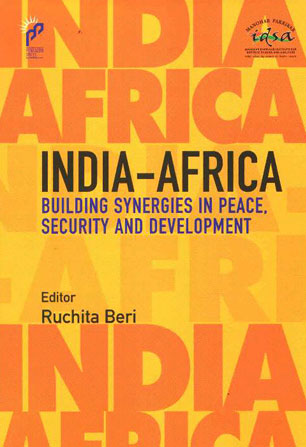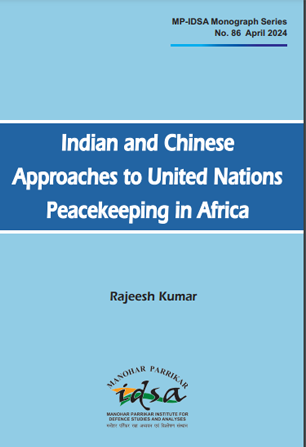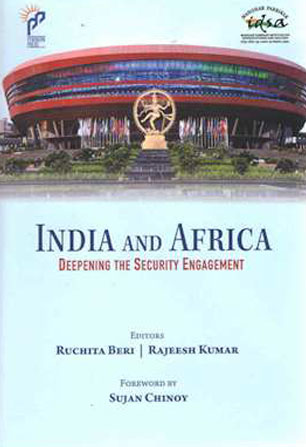India-Africa: Building Synergies in Peace, Security and Development
- Publisher: Pentagon Press
This book represents an effort to present views on peace, security and development partnership between India and the African countries. India and Africa both recognise that peace, security and development are intimately interwoven. While peace ensures opportunity for development, security enables as well as protects fruits of development. Africa is a continent which has witnessed many conflicts. However, Africa has also witnessed economic growth and political reform in the past decade. This volume brings together perspectives from Indian and African experts on diverse issues such as security, trade, development, conflict resolution, peacekeeping, terrorism and climate change. It will be of interest to students and researchers of African studies, India- Africa relations and security studies.
- ISBN: 9788196872298 ,
- Price: ₹ 1295/-
India and Africa: Deepening the Security Engagement
- Publisher: Pentagon Press
This volume delves into the multifaceted relationship between India and African countries, focusing on their evolving security, economic, energy and technological cooperation. It tracks the development of this partnership, highlighting India`s proactive involvement in Africa. The volume examines India`s contributions to African security, including maritime security, as well as its role in addressing energy and food security challenges on the continent. It also delves into the complexities of cybersecurity and skill development, underscoring the importance of collaborative efforts to tackle mutual concerns. Through a detailed analysis, this volume provides valuable insights and recommendations for enhancing the strategic partnership between India and Africa in the years ahead.
- ISBN: 9788197198687 ,
- Price: Price: ₹ 1295/-
Indian and Chinese Approaches to United Nations Peacekeeping in Africa
This monograph delves into Indian and Chinese approaches to UN peacekeeping in Africa, offering insights into how these rising powers interact with African nations. It analyzes their motivations and guiding principles in peacekeeping on the continent, comparing their approaches and highlighting differences in scope and impact.
Development and India’s Economic Multilateralism: Where from? … Where To?
The Financing for Development (FFD) process and the Sustainable Development Goals (SDG) process are some of the recent events in the realm of economic multilateralism in the United Nations (UN). India, on its part, has always engaged with the UN and global multilateral processes. This study seeks to focus on India’s diplomacy on FFD and SDGs in the context of its long history of engaging with global economic governance through the UN.
The International Committee of the Red Cross in Internal Armed Conflicts
- Publisher: Palgrave Pivot
This book critically examines the possible dilution of the neutrality principle of the International Committee of the Red Cross (ICRC) in internal armed conflicts. It begins with the proposition that the intervention of ICRC in internal armed conflicts led to compromises in neutrality, and questioned the autonomy and independence of the organization. The book also argues that the field operations of the international humanitarian organizations during internal armed conflicts are dependent on the authority exercised by the state in whose territory the conflict persists. The ICRC’s involvement in Sri Lanka and Sudan provides empirical support to validate these propositions and arguments.
- E-book ISBN:978-981-13-2601-1, Hardcopy ISBN: 978-981-13-2600-4,
- Price: E-book - $54.99, Hardcopy - $69.99
United Nations Security Council Reform: Perspectives and Prospects
Over the years, the world has changed in fundamental ways. We are witnessing a resurgence of Asia, Africa and Latin America. Growth and development have not only made the countries more interdependent, but new and increasingly complex challenges have also arisen. For multilateralism to remain relevant and effective in today's world, multilateral institutions must adapt and reform to reflect contemporary geo-political realities. It is in this context that the expansion of the UN Security Council is of significance.










